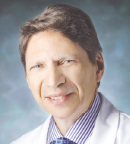A NOVEL APPROACH using two doses of nivolumab (Opdivo) prior to surgery achieved major pathologic responses in 45% of patients with resectable stages I to IIIA non–small cell lung cancer (NSCLC), according to the results of a small Stand Up 2 Cancer–Cancer Research Institute Dream Team study presented at the 2018 Annual Meeting of the American Association for Cancer Research (AACR).1 The study was published online in The New England Journal of Medicine to coincide with the presentation.2
“Every day thousands of patients will have surgery and be told by their surgeons ‘we got it all.’ Unfortunately, that is frequently not the case. Five-year survival for NSCLC is below 50%. There is a great need for new therapies for resectable lung cancer,” explained senior author Drew Pardoll, MD, PhD, Director of Bloomberg-Kimmel Institute for Cancer Immunotherapy and Director of Cancer Immunology at Johns Hopkins School of Medicine, Baltimore.
“Micrometastases are the primary source of relapse after surgery. The rationale for neoadjuvant anti–programmed cell death protein 1 (anti–PD-1) treatment of resectable NSCLC was to use the primary tumor as an ‘auto-vaccine’ to induce T cells against tumor antigens that would then circulate through the body systemically and seek out any distant sites of micrometastases,” he explained.

“We are optimistic this approach will eventually be practice-changing and may augment—or even replace—chemotherapy prior to surgical resection.”— Drew Pardoll, MD, PhD
Tweet this quote
When there are no radiologically detectable metastases, neoadjuvant chemotherapy or chemoradiotherapy is often given to patients with NSCLC to shrink a large tumor located near an organ or blood vessel, making it more amenable to surgical resection. The investigators hypothesized that giving neoadjuvant immunotherapy would do something very different—namely prime the immune system to attack micrometastases and thereby prevent relapse after surgery.
“The most stunning finding was that 9 of the 20 patients who had surgery after anti–PD-1 had a major pathologic response [ie, < 10% of viable cancer cells detectable in the resected tumor after neoadjuvant treatment]. Two patients had no evidence of viable cells in the resected specimen. This is particularly striking given the surgery was done, in most cases, just 4 weeks after the first dose of anti–PD-1 treatment,” Dr. Pardoll told the audience.
Key Study Findings
THE STUDY enrolled 22 patients with newly diagnosed resectable stages I (> 2 cm), II, and IIIA NSCLC. Of them, 21 were treated with 2 doses of nivolumab at 3 mg/kg intravenously on days 14 and 28. Twenty patients went on to surgical resection 4 weeks after the first dose and were then followed with standard-of-care postoperative management. Of the study patients, 62% had adenocarcinoma, 81% had stage II or IIIA disease, and 86% were current or former smokers.
According to radiologic criteria, 2 patients achieved a partial response, 18 had stable disease, and 1 had progressive disease 4 weeks after nivolumab treatment.
PILOT STUDY OF NEOADJUVANT IMMUNOTHERAPY
- Neoadjuvant PD-1 blockade appears to be safe and feasible in patients with stages I–IIIA NSCLC prior to surgery.
- ‘Impressive’ antitumor activity was observed with this approach, which is being explored in multiple studies.
- Almost all patients had evidence of tumor shrinkage on pathology.
“But does radiology tell the whole story?” Dr. Pardoll asked. “Apparently not. After the tumors were resected, a much larger number [9 of 20, 45%] showed significant pathologic regression, defined as replacement of tumor cells by nontumor cells, including many lymphocytes,” Dr. Pardoll continued.
Patients were followed for more than 1 year after surgery. A total of 18 resectable patients were still alive more than 1 year later, 3 of them at 2+ years later. Three patients had disease progression. There were two deaths, one from a traumatic fall unrelated to cancer. The median duration of recurrence-free survival had not been reached at data analysis. At 18 months, the recurrence-free survival rate was 73%.
The study demonstrated the feasibility and safety of this approach. Although surgeons were concerned about delays, there was no delay in surgery for any of the patients treated with neoadjuvant nivolumab, which appeared to have an acceptable side-effect profile.
‘Robust Infiltration of PD-1 T Cells’
THE INVESTIGATORS were able to demonstrate robust infiltration of PD-1–positive T cells into the resected tumor. Shared T-cell clones between the tumor and blood increased in the blood following anti–PD-1 treatment in eight of nine patients evaluated. Of eight T-cell clones in one of the tumors tested, five showed up in the peripheral blood after the first nivolumab dose, and the other three were evident in the peripheral blood 44 days after surgery.
Tumors with a major pathologic response had a higher frequency of T-cell clones that were shared between intratumoral and peripheral compartments and a higher clonality of the
T-cell population than did tumors without a major pathologic response. This finding shows that T cells proliferating in the tumor will “spill out” into circulation.
Pathologic response to anti–PD-1 treatment correlated with mutational burden. “Our findings indicate that tumor mutational burden is a primary determinant of the depth of pathologic response to PD-1 blockade,” he stated.
Clinical Implications
“WHILE IT IS still too early to tell whether our findings will translate into a lower relapse rate and improved survival, pending confirmation in a larger study, we are optimistic this approach will eventually be practice-changing and may augment—or even replace—chemotherapy prior to surgical resection,” Dr. Pardoll commented.
“Larger trials are necessary to evaluate this approach. Roughly 75 neoadjuvant PD-1 blockade trials in 7 cancer types were launched this past year. A significant number are incorporating arms with combinations of immunotherapy and chemotherapy and other immunotherapy,” Dr. Pardoll shared. “There is no reason not to move immunotherapy from advanced stages of disease to the neoadjuvant setting,” he added.
“These findings of a small pilot trial are compelling. It may be that early-stage NSCLC is more susceptible to a checkpoint inhibitor than advanced NSCLC,” said press conference moderator Alice T. Shaw, MD, PhD, of Massachusetts General Hospital, Boston. ■
DISCLOSURE: Drs. Pardoll and Shaw reported no conflicts of interest.
REFERENCES
1. Forde PM, Chaft JE, Smith KN, et al: Neoadjuvant PD-1 blockade in resectable lung cancer. 2018 AACR Annual Meeting. Abstract CT079. Presented April 16, 2018.
2. Forde PM, Chaft JE, Smith KN, et al: Neoadjuvant PD-1 blockade in resectable lung cancer. N Engl J Med 378:1976-1986, 2018.


